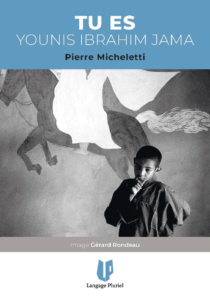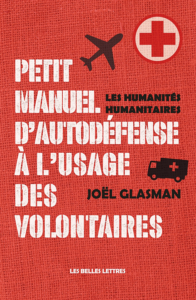
Joël Glasman
Routledge, Humanitarian Studies
Series 2020, London/New York
Joël Glasman is a historian and professor at the University of Bayreuth (Germany). Here, the author discusses his book with Vincent Hiribarren, Senior Lecturer in Modern African History, World History and Environmental History at King’s College London.
What prompted you to write a book on humanitarian statistics?
Statistics have become central to humanitarian decision-making. The omnipresence of numbers and graphics in the ongoing response to Covid-19 makes this very clear. Yet, numbers – such as mortality rates, malnutrition prevalence and refugee numbers – are ubiquitous in all major humanitarian crises. Today, all critical humanitarian battles are fought wielding numerical data and mathematical models. However, historical re- search has shown little interest in such numbers, until now. There has been significant research into the imagery of humanitarian action, its narratives, legal codification, and the ways in which it galvanises moral sentiment, inspired by the writings of authors such as Didier Fassin and Luc Boltanski. But strangely enough, there has been minimal research into the history of numbers. It is curious indeed that numerical data contin- ues to be perceived as rational, objective and dispassionate. In reality, a heavy moral responsibility is conferred upon numerical data, as it is used to answer questions such as: when should the United Nations intervene? Which organisation has legitimacy on the ground? Which populations should be the first to receive aid? Humanitarian data triggers emotions and informs decision-making, and has impacts that reach far beyond the humanitarian sector.
As an example, let’s look at the “crude death rate”, a widely used emergency threshold. For the United Nations Office for the Coordination of Humanitarian Affairs (OCHA), a humanitarian crisis is considered to be occurring in a given region if the crude death rate exceeds 1 death per 10,000 inhabitants per day. However, this threshold is arbi- trary. Indeed, the significance of any given indicator varies greatly from one context to another. In some poor countries, crude death rates are particularly high, even under “normal” circumstances. While in rich countries, such as France, the 1 death per 10,000 inhabitants per day threshold is not exceeded, even in times of crisis. This variability has prompted a number of organisations to propose the use of thresholds adapted to the different regions of the world. Thus, in order to qualify as a crisis, a disaster would need to cause at least 1.07 deaths per 10,000 inhabitants per day in sub-Saharan Africa, while 0.46 deaths would suffice in South Asia and 0.03 deaths in rich countries. How- ever, this new definition would require that, before it could be recognised as such, ahumanitarian crisis would have to claim 35 times more lives in Africa than in Europe. It is clearly impossible to define a humanitarian crisis in neutral terms. Defining a crisis statistically does not resolve the tension between abstract universalism and unaccept- able relativism.
All organisations rely on numbers. How are humanitarian organisations specific in this regard?
There are two main points of view regarding humanitarian statistics today. For some, statistics guarantee integrity, transparency and effectiveness. The United Nations itself is calling for a “data revolution” and “statistical evidence-based” humanitarian aid. Many authors ardently argue this point of view: they see the growing use of statistics, technological tools and mobile technologies as a natural corollary to increasing spe- cialisation and professionalisation in the humanitarian sector.
Other more critical authors see the use of numerical data as a consequence of neoliberal governmentality. For French political scientist Béatrice Hibou, for example, translating circumstances into numbers is a means of exporting market logic. As NGOs adopt busi- ness practices under the pressure of donors, practices such as accounting, management and benchmarking are gaining ground throughout the world.
There is, of course, a measure of truth in both these points of view on humanitarianism. On the one hand, a process of specialisation is undeniably underway. And on the oth- er, neoliberal principles are in effect being applied, causing widespread competition between individuals, in ways that sometimes tend towards the absurd. Competition is increasing between affected populations competing for aid, between NGOs competing for funding, and between donors.
However, though the critique of neoliberalism is necessary, it must not blind us to the fact that humanitarian organisations have a measure of independence, and therefore a responsibility in the development of humanitarian statistics. In my book, I consid- er a third perspective. I believe that contemporary humanitarianism’s “quantification fervour” is not solely attributable to external pressure. It is also a natural by-product of humanitarianism’s own self-determined trajectory, as can be seen by examining the concept of “basic human need”. Humanitarian organisations have themselves re- peatedly made decisions that lend altogether excessive – and sometimes irrational – weight to statistics. Yet, humanitarian statistics are often quite poor in quality. This is not because those who produce statistics are inept, but because disasters are by their very nature difficult to comprehend statistically. Models are useful, but crises do not fit neatly into models. When a crisis first occurs, nobody knows what parameters to measure, how to measure those parameters, what to compare them with, etc. We are inevitably in the dark. What is more, humanitarian organisations often operate in regions where the institutions that are responsible for producing numerical data and documents have been destroyed or considerably weakened. Caution would therefore require that humanitarian organisations rely upon a diversity of expertise. However, the data generation imperative tends to end dialogue, attributing disproportionate im- portance to “statistical evidence” that curtails debate. The faith placed in humanitarian indicators today is excessive.
What is the significance of the concept of “basic human need”? How are humanitarian organisations quantifying these needs in Central Africa?
The concept of “needs” is central to the humanitarian narrative. Despite competing in other arenas, all major humanitarian aid actors agree when it comes to the crucial importance of “basic needs”. This consensus is expressed in the Core Principles signed by humanitarian organisations. At the beginning of the 20th century, helping people “impartially” meant helping everyone without discrimination (based on nationality, religion, etc.). Today (since the 1960s), the concept of impartiality has evolved con- siderably. Indeed, impartiality has come to signify the allocation of resources “based
on humanitarian needs” (as specified by the Humanitarian NGO Code of Conduct: “aid priorities are calculated on the basis of needs alone”). In order to be considered fair, aid must be proportional to need. However, this new definition has, in essence, replaced a moral principle with a mathematical rule. Nowadays, humanitarian doctrine requires, almost by definition, that humanitarian organisations are able to define, measure and compare the needs of populations. Humanitarian organisations define minimum thresh- olds, standards and lists of conditions required for survival (e.g. 2,100 kilocalories and 15 litres of water per person per day, 250 grams of soap for bathing per person per month, etc.). The problem lies in the inevitable arbitrariness of these universal stand- ards. In reality, different societies have very different outlooks on what people need. Yet, humanitarian organisations define the needs of populations based on their own concerns – their own limited resources, their own power struggles on the ground, their own need for good relations with their partners, etc.
Let’s take the example of Cameroon. In recent years, Cameroon has been qualified as a country “undergoing a humanitarian crisis”. With the influx of Nigerian and Central African refugees between 2014 and 2015, a host of international emergency aid or- ganisations intervened on the ground: NGOs such as Médecins sans Frontières, Première Urgence, etc. along with United Nations agencies such as the United Nations Children’s Fund, (UNICEF), the World Food Programme (WFP) and the Office of the United Nations High Commissioner for Refugees (UNHCR). All these organisations produce numerical data: UNHCR on the number of refugees, UNICEF on child malnutrition, WFP on food security, etc., but ultimately, the question of how to allocate resources remains. Should priority be given to the refugees defended by the UNHCR, the displaced persons docu- mented by the International Organization for Migration, or the malnourished children identified by UNICEF? How should the needs of different groups be compared? And how should these needs be prioritised? As the central office of the United Nations, it is OCHA’s duty to carry out this coordination work. Yet, in order to avoid the wrath of com- peting humanitarian organisations, OCHA employs algorithms to produce health-sec- tor-specific arithmetic averages. In other words, OCHA produces somewhat arbitrary “vulnerability” ratings, the ambition of which is simply to achieve consensus among aid operators. Thus, the calculation of “needs” is determined as much by the power struggles between humanitarian organisations as it is by the requests of populations.
We would like to thank Vincent Hiribarren for allowing us to reproduce his interview with Joël Glasman, originally published on the Africa4 Blog (https://www.liberation.fr/dossier/blog-africa4/) that he hosted alongside Jean-Pierre Bat.
Translated from the French by Naomi Walker


